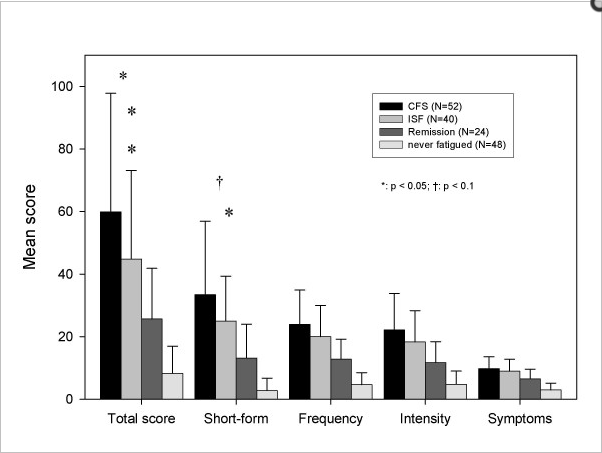CDC 2005 Symptom Inventory for CFS
The CDC 2005 Symptom Inventory for CFS, also called the CDC CFS Symptom Inventory is a self-report questionnaire designed by the CDC about physical symptoms that a ME/CFS patient may have experienced during the past month.
The CDC stated that there were several self-report questionnaires which measured fatigue and illness impact, such as the Medical Outcomes Survey Short-Form-36 (MOS SF-36), Multidimensional Fatigue Inventory-20 (MFI),and the Chalder Fatigue Scale, but few evaluated the case defining symptoms which accompany CFS. In testing the validity of the CDC CFS Symptom Inventory, one hundred sixty-four subjects were enrolled during the CDC Wichita Clinical Study from December 2002 to July 2003. Three groups were chosen to fill out the questionnaire: one with CFS (diagnosed using the Fukuda criteria), one with other fatiguing illnesses and one non-fatigued control group.[1]
In 2005, the results were published in Psychometric properties of the CDC Symptom Inventory for assessment of Chronic Fatigue Syndrome by Dieter Wagner, Rosane Nisenbaum, Christine Heim, James F Jones, Elizabeth Unger, and William Reeves. They concluded that: "The Symptom Inventory appears to be a reliable and valid instrument to assess symptoms that accompany CFS."[2]
The inventory asks the patient to rate his/her experience in the past month with the following symptoms: sore throat, tender lymph nodes or swollen glands in your neck or armpits, diarrhea, unusual fatigue for at least one day after exertion, muscle aches or pains, joint pain, fever, chills, unrefreshing sleep, sleeping problems, headachess, forgetfulness or memory problems, difficulty thinking or concentrating, nausea, stomach or abdominal pains, sinus or nasal symptoms, shortness of breath, eye sensitivity to light, depression, and a blank line for any symptom not already listed.[2]
Mean scores for Symptom Inventory by subject classification[edit | edit source]

Learn more[edit | edit source]
See also[edit | edit source]
References[edit | edit source]
- ↑ "Witchia data access | Myalgic Encephalomyelitis/Chronic Fatigue Syndrome (ME/CFS) | Myalgic Encephalomyelitis/Chronic Fatigue Syndrome (ME/CFS) | CDC". Centers for Disease Control and Prevention. July 3, 2018. Retrieved October 15, 2018.
- ↑ 2.0 2.1 2.2 Wagner, Dieter; Nisenbaum, Rosane; Heim, Christine; Jones, James F; Unger, Elizabeth R; Reeves, William C (July 22, 2005). "Psychometric properties of the CDC Symptom Inventory for assessment of Chronic Fatigue Syndrome". Population Health Metrics. 3: 8. doi:10.1186/1478-7954-3-8. ISSN 1478-7954. PMC 1183246. PMID 16042777.

